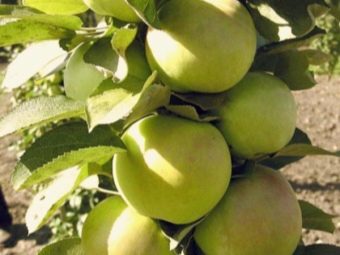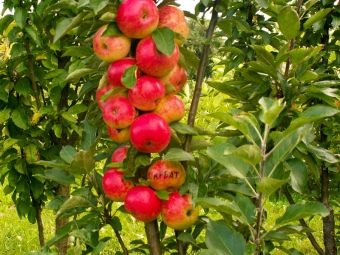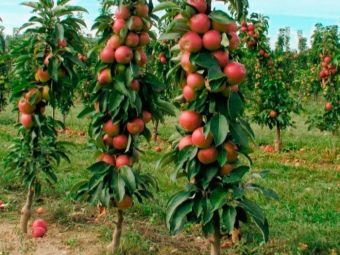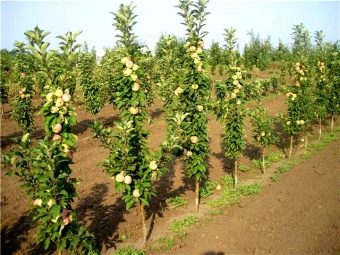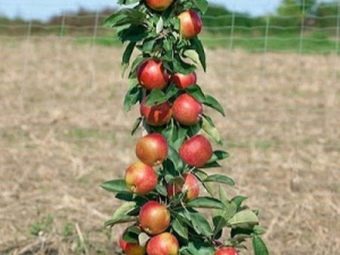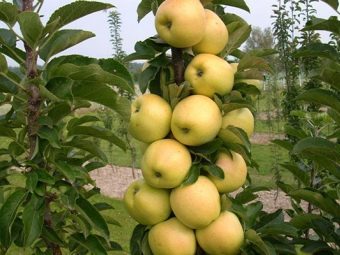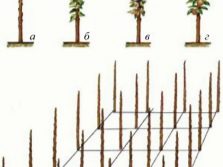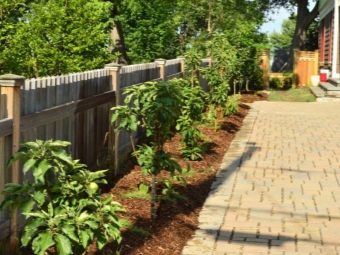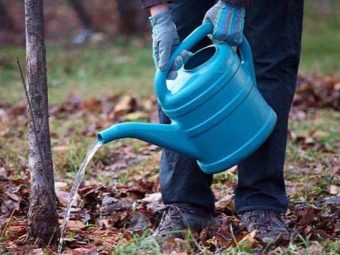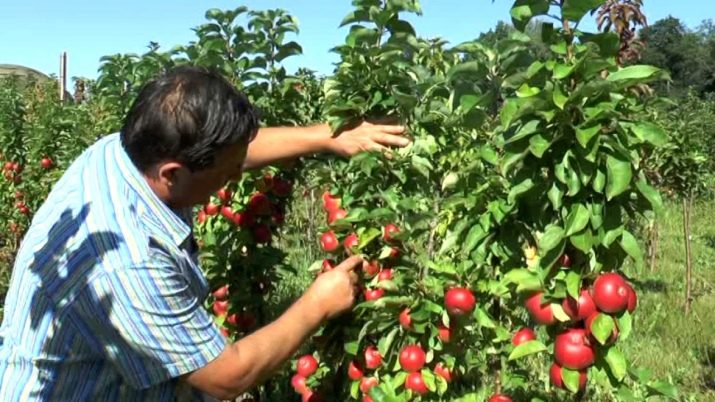Colony-shaped apple "Maluha": description of the variety, planting and care
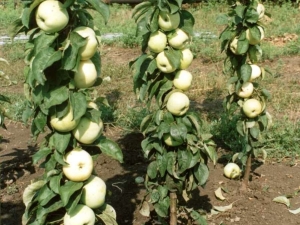
Colony-shaped apple "Maluha" is the best purchase for the garden.This variety has a large number of positive reviews from delighted gardeners who prefer only the best varieties. To grow a healthy tree, which will give a lot of fragrant and juicy fruits, you need to know the description of the variety, as well as how to grow seedlings.
Characteristic
The plant is a medium sized tree. Its height is one hundred and eighteen centimeters. This is a natural dwarf tree, which is a worthy symbiosis of an ornamental and fruit plant. That is why culture is so appreciated by many gardeners. You can cultivate the Maluha variety in the Urals or in the middle zone of the Russian Federation. The apple tree is of medium height, large yellow-green fruit. It can be used as an interesting element in a landscape design composition with decorative flowers or shrubs.
Apples grow evenly, which is a plus for those who want the harvest to be easier. This fact facilitates the process of plant care. "Maluha" is a varietal variety. The first harvest begins to ripen in the second year after planting. A young tree cannot surprise a gardener with a large number of fruits, but from each plant he will receive four and a half kilograms. From the fifth year of growth the tree will become more active and will bring to the owner from thirteen to fourteen kilograms of apples each year.
The fruits are of medium size, each weighing two hundred and fifty grams. Yellow-green peel looks appetizing and attractive, on some apples there is a bright light red blush. It is not too thick, but extremely durable, has a not very pronounced wax coating. The flesh is almost white, juicy, the taste is sweet and sour, pleasant. The aroma is strong and steady.
Apples ripen completely in early fall. They are able to maintain the presentation and taste to mid-winter.
You should not worry about the fact that trees can freeze in winter, because this variety has a very high frost resistance. These plants are also not afraid of many fungal diseases, which allows gardeners not to spend money on expensive chemicals to get rid of them.
Advantages and disadvantages
The Maluha variety has become popular and in demand due to such positive qualities as:
- trees take up little space and are compact, in a small area you can fit many apple trees; due to the absence of branches, the variety does not prevent other fruit crops from growing, and therefore is an ideal neighbor;
- the plant looks incredibly attractive and original, so it is often used to decorate the garden;
- fruits have an excellent presentation, look beautiful and appetizing;
- with proper storage, apples remain tasty and juicy for quite a long time;
- trees are low, which makes it possible to harvest without any problems;
- to care for the variety is extremely simple;
- Apple's immunity allows gardeners not to think about how to get rid of insects or pathogenic bacteria.
Variety "Maluha" has several drawbacks, one of which is not too abundant fruiting, which is short and short. With age, the yield of the tree falls. The second drawback is that the seedlings have a rather high cost.
Despite its shortcomings, this variety is an ideal purchase for any garden. A gardener can not only get tasty and healthy fruits, but also decorate his garden.
How to plant seedlings?
Variety "Maluha" extremely easy to plant and grow. It is better to prepare the pits for planting in the autumn, and to plant seedlings in the spring. It is necessary to dig a hole, the depth of which is fifty centimeters, since the roots of such plants will not go too deep into the soil. The width should be made also fifty centimeters, but it can vary from the scope of the root system of the tree.It is necessary to leave a distance of sixty centimeters between trees, and one meter between rows. This distance is enough for the root systems of nearby plants to not interfere with each other in the process of growth. Any other crop can be planted nearby, cereals are an ideal option.
Before planting, the root system of seedlings should be carefully straightened so that it does not get damaged. Then the bottom of the pit is covered with rubble and sand (twenty-five centimeters). The earth is mixed with eighty grams of superphosphate, four kilograms of humus and forty grams of potassium sulfate. The mixture is placed in the prepared hole. In the hole, the gardener must form a small hill, and then drive a peg into it, which will become a support for the tree.
The seedling should be placed in the center of the hill, carefully tied to a stake and fill the hole with soil. Sometimes it is necessary to tamp the ground. When the pit is half full, pour half a bucket of water into it, and then completely fill it with soil. It is better to put a little more soil in order to keep the stock, as it can sag. After you need to water the plant again with two buckets of water. Sapling re-tied to a support.
How to care for trees?
Variety "Maluha" does not need any specific care, so any person can cope with it. Required timely water the plants, especially for the first time several years of growing a sapling, make useful fertilizers and take preventive measures, treating wood with insecticides and fungicides. Despite the fact that the variety has a high resistance to various diseases, some diseases can still hit it, so it’s worth taking care of it extremely responsibly. Nessesary to use dry fertilizers which are placed on the ground surface. And also you can slightly deepen them into it.
In the first year of plant growth, experienced gardeners feed the tree with a nitroammofoska (fifty grams per plant). After four weeks you should feed the young plant again. For the second feeding, a solution of urea is used (two tablespoons of the product per ten liters of water). The third time the culture is fed four weeks after the second one of the above means. These procedures are combined with regular irrigation and mulching of the soil, so that nutrients and water can be stored longer in the soil.
"Maluha" need moderate watering. If the land is light, the plant is watered several times in fourteen days, but for different regions the irrigation schedule is different. It is necessary to ensure that the soil was slightly damp at a depth of five centimeters. You should regularly check the soil on which the seedling grows for moisture. Thus, the gardener will be able to build their watering schedule. Apple trees are treated with fungicides and insecticides in spring and autumn, which helps the plant to maintain good immunity to fight against various diseases.
In winter, you need to take care of apple trunks, wrapping them in a netting net that will protect the trees from the effects of rodents and parasites.
Reviews
Experienced gardeners who grow this variety report that apple trees have extremely high yields, their fruits are incredibly tasty, can be stored for quite a long time, do not lose their presentation, and are easily transported. From the reviews you can see that “Maluha” is an ideal option for people whose areas are small, since there you can grow many such trees and easily achieve a good harvest. Quite often, people use this variety for design decoration, make up beautiful compositions. "Maluha" is able to make the garden original and unique. Many say that the variety is unpretentious, easy to care for.
With proper care, the apple tree develops quickly.But if you treat carelessly carelessly, the yield will decrease, the immunity of the tree will fall. In many reviews, gardeners write that the variety practically does not become ill, since it is resistant to many diseases. If a disease affects a tree, it is extremely easy to get rid of it. Most of the reviews are positive, almost all the owners of this variety advise him to anyone who wants the site to grow not only beautiful but also prolific tree.
The following video tells how to care for columnar apple trees.

